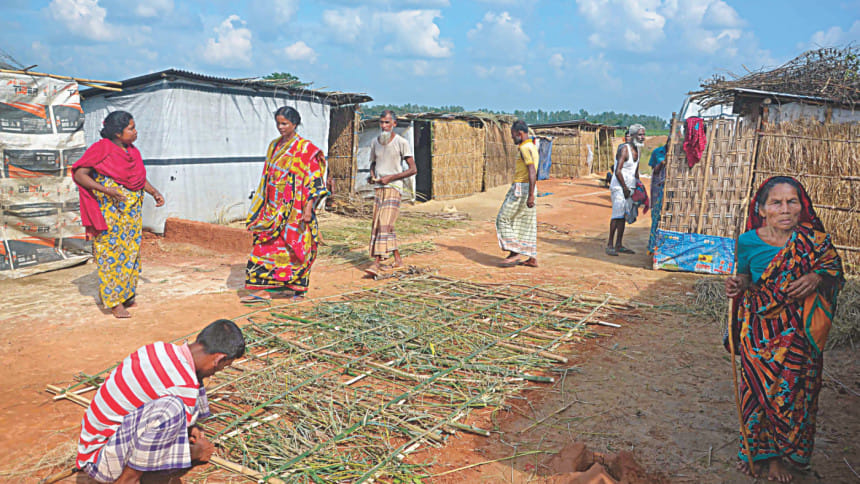Rangpur Sugar Mills: Production on despite loss

Despite incurring losses, the Rangpur Sugar Mills Ltd in Gaibandha is increasing production to make sugar, a move which according to the Santals is aimed at stopping them from returning to their ancestral land.
The mill, spanning 1,842.30 acres and about 20 kilometres from the Shahebganj-Bagda cane farm in Gobindaganj upazila, counted losses of Tk 3.65 crore in fiscal 2018-19, while it was Tk 4.09 crore and Tk 3.39 crore in the two previous years, shows its balance sheet.
The losses in these three years were much higher compared to the preceding years. Previous reports show a profit of Tk 50 lakh in 2014-15 and a loss of Tk 49.73 in 2015-16.
The mill’s Managing Director Md Rafiqul Islam attributed the losses to a hike in labour and irrigation costs. “The soil quality was not congenial to cane farming either, resulting in low yield,” he told The Daily Star recently.
However, Khaledur Rahman, an officer at the upazila Department of Agricultural Extension, said the soil was of optimal quality for cane production.
The land mainly belongs to the Santal community. However, they were evicted in 1956, leaving them landless.
Six years after the eviction, a land acquisition agreement was signed in 1962 between the then Pakistan Industrial Corporation, which subsequently set up the Rangpur Sugar Mills, and Office of the Deputy Commissioner, Rangpur, to cultivate sugarcane for the mill.
The agreement had a condition that if the authorities produces any crop other than raw materials for the mills, the land would be given back to the Santals. The mill did fail and the Santals returned but they were driven out violently with their homes being looted and torched.
It has been three years since the Santals living on a sugarcane farm in Gaibandha were brutally evicted by police backed by influentials in an operation that left three Santals dead and many injured with many more missing on November 6, 2016.
Since then, around 1,200 Santal families are living in tents near the area amidst uncertainty and fear.
The mill authorities first violated the agreement when the mill shut down in 2004, and they began leasing the land out to local influential groups at a rate of Tk 2,000 per acre. The mill remained shut for three years, said Santal leaders.
These influential groups then began sub-leasing the lands to famers to grow crops at Tk 30,000 per acre, locals said.
The farmers cultivated paddy, wheat, maize, potato, mustard, and even the environmentally harmful tobacco on the lands.
Finding local influential people cashing in on their ancestral lands, the Santal families initiated a movement by forming Shahebganj-Bagda Farm Land Restoration Movement Committee in 2013.
Learning about the movement, Bangladesh Sugar and Food Industries Corporation rebuked the mills authorities in a letter in August 2014 for creating “complexity among local people” by leasing the farm lands.
The letter, obtained by The Daily Star, mentioned that 1,460 acres of the total 1503.50 acres of cultivable lands had been leased till February 2015.
In an appeal to the government in 2015, the movement committee demanded their land rights over the violation. An investigation by the additional deputy commissioner of Gaibandha found grounds in their claim. The Daily Star has obtained a copy of the investigation report as well.
The very next year, the mill authorities cancelled the leases and began increasing sugarcane farming.
They cultivated 7,300 tonnes of cane on 596 acres in 2016-17 raising the farm’s expenditure to Tk 5.37 crore, which was Tk 84.89 lakh in the previous year, despite no cane production then.
The authorities increased cane cultivation in the following years -- to 1,063.65 acres in 2017-18, yielding 10,045 tonnes of cane, and 1,013 acres in 2018-19, yielding 10,526 tonnes.
The managing director of the mill said the farm was dedicated to cane farming, to ensure raw materials for the sugar mill.
Average cane production at the farm stood at 10.69 tonnes an acre. However, local cane farmers could produce an average of 28 tonnes an acre in their private farms -- almost 2.5 times more.
During a visit to the farm last month, this correspondent noticed vast areas of farm land lying idle, with some scattered patches under cane cultivation.
Local cane farmers said the mill was incurring losses for corruption and irregularities. They said the mill authorities do not show the actual acreage under cane production, or labour and irrigation costs.
Rafiqul denied these allegations.
In its 62 years of operations, the sugar mills incurred losses 44 times, while it was shut for three years, and counted profits 15 times.
The production cost of each kilogram of sugar at the mill is Tk 345.66 against sugar prices of Tk 55, making a loss of Tk 290.66 per kilogram.
Talking to The Daily Star, Santal leader Philemon Baskey said the mill authorities were not allowing them to return to their ancestral land, despite incurring losses for years.
“They [mill authorities] don’t want to check the losses and that’s why they have increased the cane production,” he added.

 For all latest news, follow The Daily Star's Google News channel.
For all latest news, follow The Daily Star's Google News channel. 



Comments